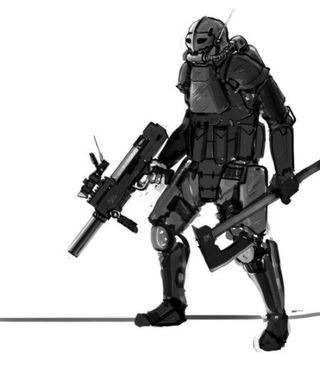Community heroes: we talk to the man behind Civilization II's Eternal War

You said that you had your own sense of what that world was like.
Yeah, after a certain amount of years of playing this it, I was just like, “wow... I had to do away with democracy”. There were so many things that happened, I couldn't help it.
Did you document it as you were going, or was it just in your head?
It was just in my head. It was like, well, yeah I'll return to this cool game I've been playing for a while. I just kept on playing, I suppose, and I thought it was pretty neat and I'd share it with reddit - and wow, the response was incredible.
Do you feel like it belongs to that subreddit community now, or are you tempted to do something else with it yourself?
I'm really not sure, but I put it on reddit and people have created art out of it - that's incredible, and it's the community's at that point.
When I play Civ, my civilisations are always modelled after how I would like the world to be. But I've also got friends who play these games mathematically. They're not worried about the connotations of turning to fundamentalism, say.
Comic deals, prizes and latest news
Sign up to get the best content of the week, and great gaming deals, as picked by the editors.
I'm on the opposite end of that spectrum, I would argue.
In what regard - that you play mathematically?
No, I play... romantically, I suppose.
How much do you feel like you had to break down that romantic approach to Civ to keep surviving beyond a certain point?
I think that, in its own right, was somewhat romantic. The democracy that I'd strived for was becoming a liability and the best course of action was to switch to a communist state. My ultimate intention was to restore democracy when the war was won, but that was romantic and adds to the narrative of the whole thing. Tragically so.

Image: 'Neo-Viking Spec Op', by Gauntes
Turn-based grand strategy is having a bit of a resurgence at the moment. Civ V: Gods and Kings is doing very well, Endless Space is doing very well - do you think there's untapped potential for narrative in that genre, given your experience?
I would certainly argue that there hasn't been enough attention [to narrative] in grand strategy games, or at least the ones I've played - Civ, GalCiv. I haven't played Endless Space, that's the new one, isn't it?
Yeah. They've got an interesting approach to narrative, where their factions are really asymmetrical. You can be regular space dudes, but you can also be omniscient amoeba people that can see the entire map the entire time.
Interesting!
Your Civ story reached the point it got to because of the hard balance of the game. Would imbalance ultimately break that, or does it create better stories?
I think it can go both ways, depending on your interpretation of it - for example, in Civ IV I played as the Holy Roman Empire, built the Apostolic Palace in my capital, was the Pope, was able to set policies to have different Christian countries vote on it. That was great, because I was playing the role of the Vatican and that was a wonderful game, I really enjoyed it even though I was probably the weakest militarily. Because of my influence in the dominant religion I was able to be quite successful. I think that's a great example of imbalance working in my favour. I think Civ IV was really great for that.
When I'm talking about balance I'm talking about the mathematical balance of Civ II, where empires were so enormous at that [late] stage of the game where each country has at least fifty cities and taking three or four cities is nothing. In Civ V, if you take three or four cities you've likely destroyed the enemy empire.
Is game design something you're interested in taking further?
I'd love to take it further, certainly. It's an art form, and ultimately that's where my interests lie. My day job is as an insurance agent - dare to dream, right? So yeah I'd love to take it further, see what comes along.
You mentioned the roleplaying element of playing as the Holy Roly Empire in that Civ IV game...
Yeah, it was incredible. I have an enormous love of history - I'm an enormous history buff. Of course the Holy Roman Empire was neither Holy, nor Roman - but you could play as the Vatican in Civ IV and that was as close as I came.
That drive to - not recreate history, necessarily, but to re-enact certain parts of it - do you find that makes the experience more satisfying, to have certain elements that you know you're doing 'right'?
Yeah, absolutely. You're following these historical tropes that seem to play out over the course of human history. When you see them repeated in the game, there's a wonderful sense of accomplishment.

Image: infectedmanz's 'Celtania Propaganda' .
Do you think there's anything developers could be doing to encourage that kind of creative engagement? It seems to be the thing that creates all the best stories.
Absolutely. In fact, I think there's a lot they can do. I've really enjoyed what they've done with Civ V in bringing back religion and espionage. If they pursued that further, and implemented internal politics - I remember in GalCiv II, if you were a democracy you had to choose a political party, and there would be an element of internal politics which was incredible. Civ II had something like, if you took over the enemy capital there was a chance their nation could fracture into two opposing factions. There was also an interesting element like that in Civ IV where if you founded cities on another continent you could grant them independence and they'd become a colony - a vassal - of your empire. That was beautiful. If they reintroduced those elements - things like vassalship, colonisation - a little bit more complexity, perhaps, when it comes to running your empire.
I understand that they're focused on conflict and making warfare as interesting as possible but things like inflation, interest rates once you've built a central bank - I can understand why that might put off some more casual players, I understand that completely, but I think it should be an option. You should be able to increase the complexity of the game.
I guess the deeper and more technical mechanical aspects of these games, despite sounding really dry, really enhance the game's potential narrative depth.
I think it really does. There's also things on the other end of the spectrum. Perhaps the game could write its own history. The war between Egypt and Arabia in, say, 1770AD - that could be recorded somewhere in the game for you to review, for it to somehow affect relations or policy in the future just as diplomacy between the West and the Middle East today is still marred by the Crusades - a thousand years later! I think that'd be really interesting. Keeping track, every game of Civ having its own timeline, it's own story tell - just as real history has.
This kind of story is great for Civ and Firaxis. You can expect developers to be thinking, “how do we get this to happen, how do we get a guy to drop a story on to reddit that just blows up interest in the game.” The key to that seems to be including storytelling within the game itself - so it doesn't need to be something that people only share on blogs and reddit. Making it something that the game keeps track of.
Yeah, exactly that. And if you go to civfanatics.com there are people who have done this before, who have written stories based on individual games. If the game itself did that, and rewarded you for doing so, for creating this real history - I think it'd be incredible. The storytelling potential is just totally untapped in that regard.
Many thanks to James for his time, and a tip of the hat to the /r/theeternalwar community for their excellent work.
Joining in 2011, Chris made his start with PC Gamer turning beautiful trees into magazines, first as a writer and later as deputy editor. Once PCG's reluctant MMO champion , his discovery of Dota 2 in 2012 led him to much darker, stranger places. In 2015, Chris became the editor of PC Gamer Pro, overseeing our online coverage of competitive gaming and esports. He left in 2017, and can be now found making games and recording the Crate & Crowbar podcast.
Most Popular


